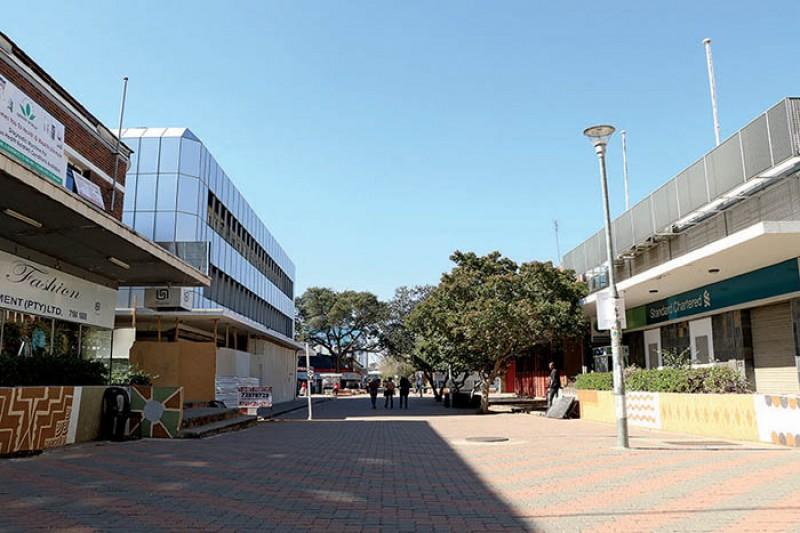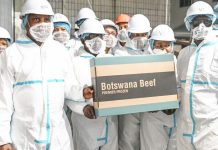Africa-Press – Botswana. The economy’s slide due to the coronavirus (COVID-19) pandemic was shown to have eased on Tuesday, with the latest Gross Domestic Product figures indicating a contraction of six percent in the third quarter, compared to the 24% collapse in the second quarter.
The latest numbers, helped by improvements across most sectors, not only underline an emerging recovery in the economy, but also the depth of the hole it had dropped into. Analysts say a six percent contraction in the economy in any other year would be cause for alarm, but in 2020, following the 24% crash, fiscal authorities will have slight smiles on their faces. “The improvement in the third quarter GDP, reflected continued efforts to reopen businesses and resume activities that were postponed or restricted due to the COVID-19 pandemic,” Statistician General, Burton Mguni wrote in a commentary on the latest GDP numbers.
Baptism of fire
With 2020 marking his first full year in office, Finance Minister Thapelo Matsheka underwent a baptism of fire as he watched his carefully calculated budget figures and growth expectations quickly unravel. In February he announced a budget carrying a P5.2 billion deficit and forecast economic growth of 4.4 percent, and by April, he was warning of a P10.8 billion deficit and economic contraction of up to 13.1%. The difference was COVID-19, which forced government to close all borders and impose a national lockdown, knocking out key industries such as mining and tourism, while similar measures abroad reduced the demand or pricing of the country’s key export commodities. The Greater Gaborone area, the country’s key economic hub, would suffer two more lockdowns due to outbreaks of COVID-19 and by July, Matsheka was telling legislators the deficit would be P13.6 billion and economic contraction 8.9 percent. Government launched a P4 billion COVID-19 Relief Fund, providing a slew of interventions from wage subsidies to tax deferrals, while also leaning on other key stakeholders, such as banks and insurance players to grant relief to businesses and households. The minister later persuaded the National Assembly to pass the P14.5 billion Economic Recovery and Transformation Plan (ERTP), which government is banking on to tide the economy through the pandemic, while setting it on a new, priority-area footing. Within that plan, MPs also okayed a P1.3 billion Industry Support Fund designed to bail out the informal sector and existing businesses in specific sectors, while CEDA, the primary agency for citizen entrepreneurship, also launched revised guidelines with higher loan offerings at cheaper rates and more flexible conditions.
Spring in the step
As he marks the end of a punishing debut, Matsheka could however have a slight spring in his step. Apart from the improved third quarter results, there are other signals 2021 could carry over the encouraging signals seen in recent months. Diamonds, the country’s most important economic sector, is showing signs of recovery after a slump that saw exports crash from P10 billion in the first quarter to P3.5 billion in the second and P3.3 billion in the third.
De Beers, which is government’s partner in Debswana, has since noted an improvement in recent sales, with global borders reopening and demand returning in key markets such as the US, China and India.
“Positive consumer demand for diamond jewellery as we enter the holiday season is supporting the continuation of retail orders for polished diamonds from the diamond industry’s midstream sector,” De Beers CEO Bruce Cleaver said last week. “This in turn supported steady demand
for De Beers’ rough diamonds at our final sales cycle of 2020. While the diamond industry ends the year on a positive note, we must recognise the risks that the ongoing COVID-19 pandemic presents to sector recovery both for the rest of this year and as we head into 2021.”
The Budget Strategy Paper, an annual blueprint released at the start of the budget cycle, noted ‘robust recovery’ in diamond trading from September, saying if this was sustained it would anchor the economy into 2021.
The reopening of borders has also led to greater activity in the country’s tourism sector, with many bookings that had been cancelled or put on hold, reinstated. Recently, operators in Kasane, the country’s prime resort town, noted that most of the major hotels and lodges were fully booked over the festive and into next year, while the peak tourism period from April to September 2021 was equally booked.
Batswana are also flocking to tourist attractions and contributing to the sector’s recovery, helped by concessional offers made by operators. Other non-mining sectors that have increasingly played a greater role in the economy as mining has fluctuated, are also reporting a recovery from the third quarter onwards. Sectors such as trade, manufacturing, construction, restaurants and hotels, and financial services are climbing towards pre-COVID levels as the economy warms up.
In 2021, the economy is also looking forward to the commissioning of Khoemacau Copper Mine in the north west, which will produce 60,000 tonnes of copper concentrate. Debswana’s megaprojects at Jwaneng and Orapa will continue while the country’s two collieries, Morupule and Masama, both plan to intensify production activities. Sandfire Resources is also expected to start development of a P2.9 billion copper mine near Gantsi where 1,000 workers will be hired during construction.
Hurt households
Even as the numbers look rosier for Matsheka and many sectors of the economy, households look set for a difficult 2021. Although Statistics Botswana is yet to update its labour figures, it is known that many workers suffered from company closures, reduction in wages and other measures as the economy slumped this year.
Even as inflation dropped to a record low of 0.9 percent in June, many consumers could not benefit from the lower prices as their disposable incomes were eroded by the harsh labour market. Electricity tariffs were hiked by 22% in March, before postal tariffs, public transport fares and fuel prices all increased the pressure on households already battling the effects of COVID-19.
Next year comes with a Value Added Tax increase of up to 14%, an electricity tariff increase of five percent in April and phased Botswana Housing Corporation rental increases with the highest jumps reserved for the low cost housing sector. Businesses, meanwhile, are in recovery mode and unlikely to significantly adjust wages or their levels of employment. In fact, for businesses that have been struggling throughout the year, the lifting of the State of Emergency and its attendant labour regulations next March, could see an increase in retrenchments that will worsen the country’s labour situation.
For now, however, Matsheka and his lieutenants at Finance break for the festive focussed on finalising a 2021 budget that is expected to contain generally better economic numbers than this year.






